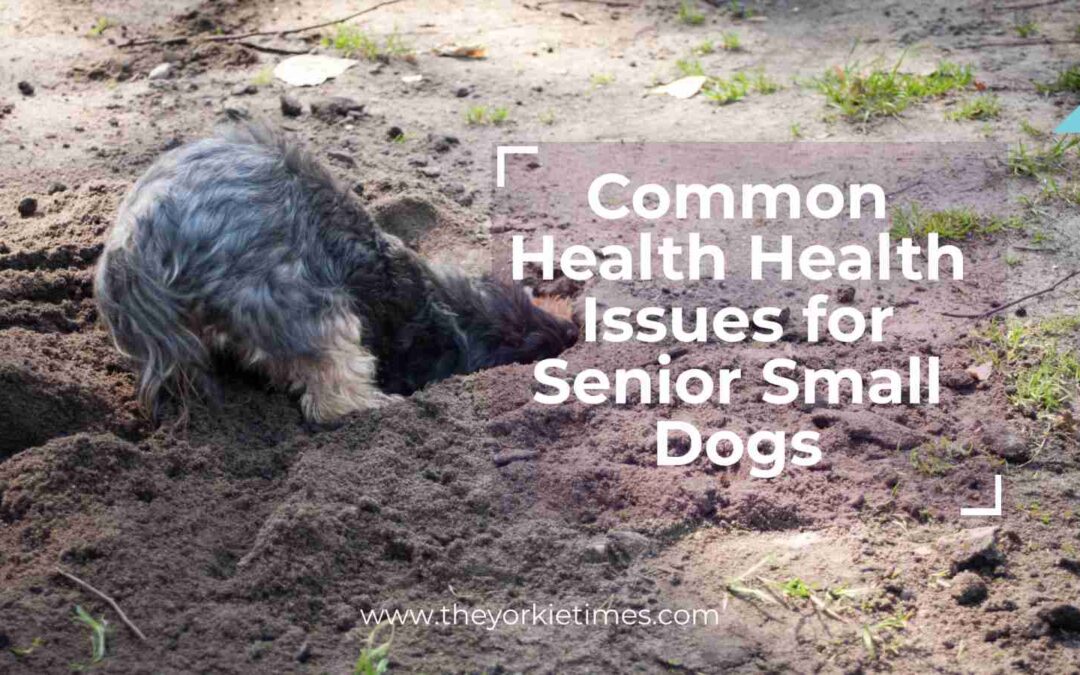As our beloved dogs get older, it’s important to be aware of the various health issues that they may face. Understanding the signs and symptoms of these issues can help owners take proactive steps to maintain a high quality of life for their furry friends. Whether it’s arthritis, vision loss, or kidney disease, there are steps owners can take to help manage health issues in senior small dogs live happier and healthier lives.
What Age is Considered Senior for Dogs?
While the age at which a dog is considered a senior varies depending on breed, generally dogs over the age of 7-8 are considered seniors. Larger breed dogs tend to age more quickly than smaller breeds and may become seniors as early as 5-6 years of age. In general, a veterinarian can help determine when a dog should be considered a senior based on breed and overall health.
How Does a Dog’s Breed Affect When They Become a Senior?
Breed plays a significant role in when a dog should be considered a senior. Larger breeds such as Great Danes or Saint Bernards tend to have shorter lifespans and may begin to show signs of aging earlier than smaller breeds. For example, a Yorkshire Terrier may not be considered a senior until 10-11 years of age, while a Great Dane may be considered a senior at only 6-7 years of age.
What Are the Signs That a Dog is Becoming a Senior?
As dogs age, there are several clear signs that they may be entering their senior years. One of the most obvious signs is a change in behavior, such as reduced activity or less interest in play. Other signs may include graying fur or changes in eating habits. In addition, many senior dogs begin to develop lumps and bumps on their skin, which should be evaluated by a veterinarian.
What are Common Health Issues in Senior Small Dogs?
Senior dogs may face a variety of health issues as they age. Some common health problems in senior small dogs include arthritis, heart disease, kidney disease, cognitive dysfunction, and incontinence. In addition, older dogs tend to gain weight more easily and may become obese, which can lead to a variety of other health problems.

Check Out Our Watercolor Yorkshire Mom and Puppy
How Can You Help Your Senior Dog Maintain a Healthy Weight?
Maintaining a healthy weight is critical for senior dogs, as excess weight can lead to a variety of health problems in older pets.
What is Obesity in Dogs and What Causes It?
Obesity in dogs occurs when they take in more calories than they burn through exercise and activity. Older dogs may become less active, which can make it more difficult for them to burn off excess calories. In addition, many older dogs have changes in metabolism that make it easier for them to gain weight.
How Can You Manage Obesity in Senior Small Dogs?
To help senior small dogs maintain a healthy weight, it’s important to feed them a balanced diet that takes into account their age and activity level. In addition, owners should encourage their dogs to engage in regular exercise such as daily walks or playing fetch. For dogs with significant weight issues, a veterinarian may recommend a special diet or medications to help encourage weight loss.
Why is it Important to Help Your Senior Dog Maintain a Healthy Weight?
Maintaining a healthy weight is critical for the overall health and well-being of senior small dogs. Excess weight can lead to a variety of health problems such as arthritis, heart disease, and diabetes. By helping your senior dog maintain a healthy weight, you can help ensure that they live a longer, happier life.
Did you know that your dog can eat the following vegetables:
- Beets
- Broccoli
- Brussel Sprouts
- Cauliflower
- Carrots
- Celery
- Corn
- Green Beans
- Peas
- Spinach
- Sweet Potato
Check out our blog on using veggies to make healthy treats for your dogs.
What Can You Do to Help Your Senior Dog with Arthritis?
Arthritis is a common health problem in senior dogs that can cause pain and discomfort.
What is Arthritis in Dogs?
Arthritis is a condition that results in inflammation and swelling of the joints. It can cause pain, stiffness, and difficulty with movement, particularly in older pets.
What are the Symptoms of Arthritis in Senior Small Dogs?
The symptoms of arthritis in senior small dogs can include difficulty walking or standing, reluctance to jump, stiffness or limping, and a general decrease in activity level.
How Can You Help Your Senior Dog Cope with Arthritis?
There are several steps owners can take to help their senior dogs cope with arthritis. Providing joint supplements or medications prescribed by a veterinarian can help manage pain and inflammation. Additionally, providing soft bedding and ramps or steps in the home can make it easier for your dog to move around. Gentle exercise such as short walks or swimming can also help keep your senior dog’s joints limber and reduce pain.
Get The Yorkie Times Newsletter delivered to your inbox!
What Can You Do to Help a Senior Dog with Vision Loss?
Vision loss is a common issue in senior dogs that can be distressing for both pets and their owners.
What Causes Vision Loss in Dogs?
Vision loss can be caused by a variety of factors including cataracts, glaucoma, and retinal degeneration.
What are the Signs that Your Senior Small Dog Might be Losing Their Vision?
Signs that a senior small dog may be losing their vision include bumping into objects, reluctance to move around in low light, and changes in behavior such as increased clinginess or anxiety.
How Can You Help a Senior Dog with Vision Loss?
There are several steps owners can take to help their senior dogs cope with vision loss. Providing a consistent environment with familiar paths and objects can help your dog navigate their surroundings. In addition, using verbal cues and providing extra sensory stimulation such as scent and texture can help your dog maintain a sense of security and comfort.
What are the Common Health Problems in Senior Small Dogs?
There are several common health problems that senior small dogs may face as they age.
What Are the Most Common Health Issues Senior Small Dogs Face?
Some of the most common health issues in senior small dogs include arthritis, cognitive dysfunction, kidney disease, liver disease, and weight gain.
How Can You Prevent or Manage These Health Problems in Your Senior Small Dog?
Preventing or managing these health problems may involve providing a balanced diet, maintaining a healthy weight, engaging in regular exercise, and scheduling regular check-ups with a veterinarian. In addition, providing a comfortable and supportive environment with soft bedding and easy access to food and water can help minimize discomfort and ensure a high quality of life for your furry friend.
What Can You Do to Ensure Your Senior Small Dog Has the Best Quality of Life Possible?
Ensuring your senior small dog has the best quality of life possible may involve providing for their nutritional and medical needs as well as providing a comfortable and supportive environment. Engaging in regular exercise, providing socialization and playtime, and ensuring proper hygiene can also help ensure a high quality of life for your senior pet.
What Can You Do to Help a Senior Dog with Kidney Disease?
Kidney disease is a common health issue in senior dogs that can lead to a variety of other health problems. Kidney disease occurs when the kidneys are no longer functioning properly and fail to filter waste from the blood. This can lead to a variety of symptoms such as loss of appetite, weight loss, and increased thirst or urination.
What are the Symptoms of Kidney Disease in Senior Small Dogs?
The symptoms of kidney disease in senior small dogs can include lethargy, weakness, decreased appetite, and increased thirst or urination.
How Can You Help a Senior Dog with Kidney Disease?
Managing kidney disease in senior dogs may involve a combination of dietary changes, medications, and supportive care. Providing a low-protein diet and ensuring that your dog has access to plenty of clean water can be helpful in managing kidney disease. In addition, medications prescribed by a veterinarian can help manage symptoms and improve quality of life.
What Can You Do to Help a Senior Dog with Canine Cognitive Dysfunction?
Canine cognitive dysfunction is a condition that can cause significant changes in behavior and can be distressing for both pets and their owners.
What is Canine Cognitive Dysfunction?
Canine cognitive dysfunction, also known as dementia, is a condition that affects a dog’s cognitive abilities and can cause memory loss, confusion, and changes in personality.
What are the Symptoms of Canine Cognitive Dysfunction in Senior Small Dogs?
The symptoms of canine cognitive dysfunction in senior small dogs can include confusion, disorientation, changes in activity level or sleep habits, and difficulty with problem-solving or learning new tasks.
How Can You Help a Senior Dog with Canine Cognitive Dysfunction?
Managing canine cognitive dysfunction in senior dogs may involve providing extra stimulation and socialization, establishing a consistent routine, and providing a comfortable and familiar environment. In addition, medications prescribed by a veterinarian can be helpful in managing symptoms and improving quality of life for pets and their owners.
What Can You Do to Help a Senior Dog with Incontinence?
Incontinence is a common issue in senior dogs that can cause discomfort and inconvenience. So what are some of the common causes of Incontinence in Senior Small Dogs?
- One of the most common causes is urinary tract infections that can cause inflammation in the bladder making the dog feel a constant urge to go.
- Kidney disease can also lead to incontinence as it weakens the muscles that control the bladder and sphincter.
- Arthritis is another factor that can cause incontinence as it limits the dog’s mobility and makes it difficult to get to the designated potty spot in time.
- Dementia and anxiety can also be responsible for the loss of control over the bladder, as the dog may forget where to go or become too stressed to release themselves properly.
Owners who notice any signs of incontinence in their senior small dogs should consult with their vet for a proper diagnosis and treatment plan. With proper care, support, and treatment, senior small dogs can still enjoy a good quality of life despite this common problem.
We know that as our beloved small senior dogs age, there are issues that will arise. If you are unsure about what your Yorkie is going through such as the emergence of age-related health problems, please consult your veterinarian. The Yorkie Times loves to share our knowledge and answer any questions that you may have! You can leave a question below or reach out to us on Facebook!





Recent Comments